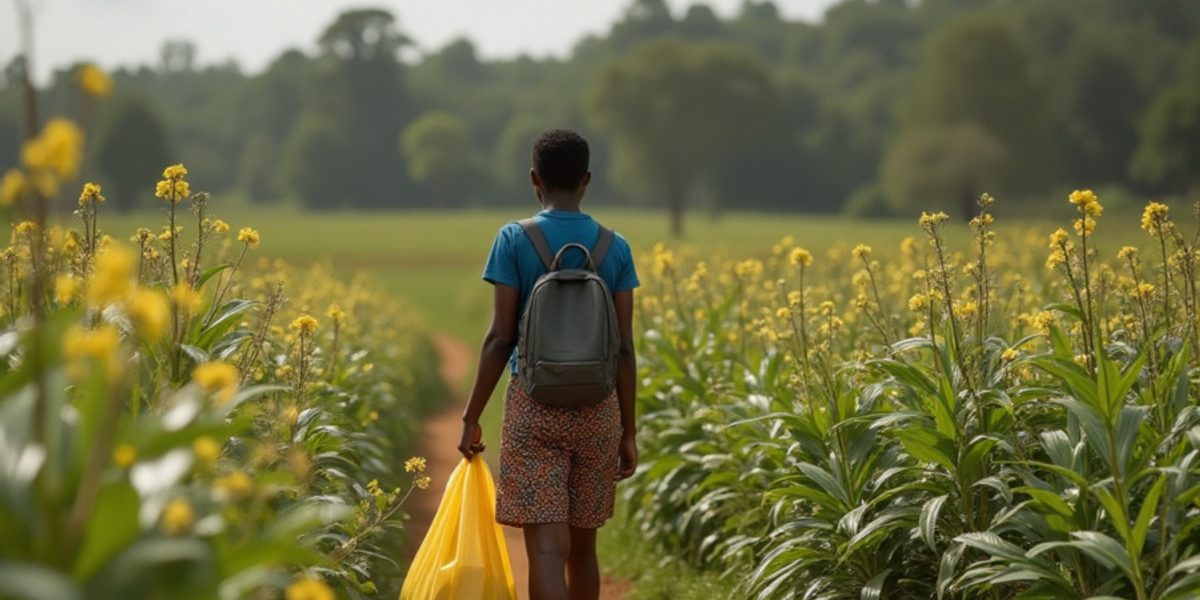Africa's Untapped Tourism Niches, A Blueprint for Growth
Introduction
Africa is on the verge of a tourism transformation
Today’s traveller wants meaning, depth, and purpose - a new wave of niche tourism is changing what it means to experience Africa... from stargazing in certified dark-sky reserves to reconnecting with ancestral roots. And the world is watching. Across the continent, rural communities are building hands-on agritourism stays. Women are opting for all-female expeditions that offer connection on their terms. Travellers are swapping ticking off wildlife checklists for nature therapy under ancient trees, or sound-driven safaris that reveal the bush in all its multi-sensory beauty. These are new experiences – and they’re also new economies. This whitepaper explores six of the most powerful emerging niches – Roots Tourism, Nature Therapy, Women-Only Safaris, Rural Tourism, Multi-Sensory Safaris, Dark-Sky Tourism – and the rare opportunities they represent. The global visitor is transforming. Africa has what they’re looking for.
Now is the time to lead…
This whitepaper explores several key niche tourism markets that are already gaining momentum
- Roots Tourism A deeply personal and increasingly lucrative travel segment as African heritage travellers seek meaningful connections to their ancestral homelands through immersive cultural experiences.
- Nature Therapy Leveraging Africa’s unparalleled landscapes to promote physical and mental well-being through guided mindfulness experiences, grounding practices, and eco-therapeutic safaris.
- Women-Only Safaris Offering an alternative to traditional safari experiences with itineraries that foster connection, confidence, and exploration on women’s terms, free from conventional expectations.
- Rural Tourism Unlocking economic growth for Africa’s rural communities through agricultural travel, locally led cultural exchanges, and off-the-beaten-path experiences that showcase the rhythms of village life.
- Multi-Sensory Safaris Evolving and enhancing the traditional game drive into fully immersive wildlife encounters that incorporate hearing, touch, taste, and scent for deeper engagement – particularly for travellers with visual impairments.
- Dark-Sky Tourism Conserving Africa’s pristine night skies while creating unforgettable celestial experiences. This niche is about sustainability and cultural storytelling as much as it is about stargazing.
Attracting more visitors is just the beginning. This is about deciding what lies ahead for African tourism. Are we ready to seize the moment?
Roots Tourism
A Game-Changing Niche for Africa’s Tourism Industry
Diaspora tourism is exciting because it allows people to reconnect with their roots. With genealogy tools and tracing ancestry becoming popular, more African Americans are coming forward to discover where they’re from. And now they’re ready to invest in trips to those regions – not just for holidays, but for meaningful, life-changing experiences.
Cynika Drake, an expert in African travel experiences
For Africa’s tourism industry, this is a market ripe with untapped potential. Ghana’s Year of Return in 2019 proved that roots tourism could be a significant economic driver – and an emotional and cultural connection point. The landmark campaign celebrated 400 years since the first enslaved Africans were taken to the Americas, inviting African descendants to “come home”. The response was monumental: over a million visitors arrived in Ghana, contributing $3.3 billion to the economy, according to the Ghana Tourism Authority.
But roots tourism is not another catch-all trend. It’s a deeply personal journey, and for tourism operators, it’s an opportunity to create transformative experiences that go beyond traditional attractions. As Cynika explains, “Diaspora tourists aren’t looking to tick off boxes or ‘see the highlights’ alone. They’re drawn by a connection to the land – they want to immerse themselves and leave with a sense of identity and pride.”
Yet, as demand grows, not all African destinations are prepared to make the most of this global opportunity. From local partnerships to intentional marketing campaigns, here’s how tourism players can lead the way
What Makes Roots Tourism Different?
Roots tourism isn’t your typical luxury or heritage travel segment. It sits uniquely at the intersection of cultural curiosity, ancestral connection, and emotional discovery. For travellers, it’s about tracing their lineage and honouring the lives of their ancestors. For African destinations, it’s about welcoming these visitors home and offering them a deeper sense of belonging.
Cynika recalls one particularly moving story: “We had a multigenerational family – grandparents, parents, and their children – who travelled to Ghana for a naming ceremony. They visited local villages and really immersed themselves in the culture. Even three years later, they say it was the most meaningful holiday of their lives.”
But this isn’t solely about cultural rituals. Roots tourists are often savvy, well-travelled professionals. Many are in their late 40s to 60s, travelling as couples or with families. A significant proportion take their children or grandchildren on what Cynika describes as “multi-generational journeys,” where the goal is to pass lessons of history and heritage through experiences.
The biggest expense is definitely the flight. But beyond that, many of our clients are professionals or executives who have the income and time to dedicate to trips like this. This isn’t last-minute tourism – it’s purposeful.
How Africa Can Tap Into the Roots Tourism Market
The demand is real. But for tourism operators and destinations, engaging the diaspora means shifting away from business as usual. Thoughtless, one-size-fits-all packages won’t appeal to this niche. And attempts to focus solely on “poverty tourism” may do more harm than good.
INSTEAD, CYNIKA PROVIDES ACTIONABLE IDEAS FOR STANDING OUT IN THIS GROWING MARKET
1. Say No to Poverty Tourism
For years, African tourism campaigns have been weighed down by harmful stereotypes: images of impoverished children or township slums have corrupted how the world sees the continent. This approach alienates roots tourism travellers, many of whom are seeking dignity and pride in their ancestral homeland.
“I don’t promote township tours,” Cynika shares frankly. “The image many people already have of Africa isn’t positive. Why reinforce that? Instead, we should focus on celebrating the continent’s beauty and success. Highlight the winemakers, the local artists, the jewellery makers – people creating something truly inspiring.”
This strategy can involve completely rewriting the script of African tourism marketing. Picture stories about thriving African entrepreneurs, boutique designers, or cutting-edge cultural institutions attracting roots travellers eager to see modern Africa triumph.
Nature Therapy
Africa’s Best-Kept Secret
Nature therapy – or eco-therapy – takes many different forms. Perhaps the most widely known is forest bathing, which has been gaining a steady following since the movement first took root in Japan in the early 80s.
As Grant Hine, eco-therapist and founder of Zen Guiding explains, forest bathing is a direct translation from the Japanese term Shinrin-yoku, which means to bathe in the atmosphere of the forest using your senses.
Hine has now adapted the forest bathing model to Africa’s safari environment, including grounding, different methods of meditation, awareness exercises and even blindfolded guiding – but all with a very intentional connection to nature.
Nature therapy represents a new approach to the traditional safari, one which Hine believes is utterly transformational.
“Nature therapy has the potential to change people's lives. It changes their perspective on the natural environment, and they come to understand the connection between nature – be it trees in the savannah, the earth or the animals – and their mental and physical health,” says Hine.
Eco-therapy is a way of using nature, or benefiting from nature, through a facilitated process, that leads to personal growth and development. And the wonderful thing? It’s all based in science.
Niche Tourism Whitepaper
ATTA® has released a pioneering whitepaper titled Africa’s Untapped Tourism Niches: A Blueprint for Growth – a comprehensive analysis of six emerging niche tourism sectors set to revolutionise travel across the continent.
The whitepaper comes at a pivotal moment for African tourism, as destinations seek innovative ways to attract visitors in an increasingly competitive global marketplace. Substantial growth opportunities are identified in dark-sky tourism, nature therapy, roots tourism, rural tourism, multi-sensory safaris, and women-only expeditions.
“While the focus is on diversifying our tourism products, niche tourism is also about fundamentally reimagining what African tourism can be,” said Kgomotso Ramothea, ATTA® Membership CEO. “Our research shows that while traditional safaris remain our backbone, these emerging niches offer unprecedented opportunities to extend tourism benefits to previously overlooked communities while meeting evolving traveller demands for authenticity and purpose.”
The whitepaper’s findings challenge long-held assumptions about African tourism development, highlighting how lesser-known destinations can leapfrog established markets through strategic investment in niche experiences.
“What’s particularly striking is how these niches align perfectly with post-pandemic travel trends,” Ramothea explained. “From the healing power of nature therapy in our vast wilderness areas to the profound emotional journeys of roots tourism, Africa is uniquely positioned to deliver exactly what today’s conscious travellers crave – meaningful connection, personal transformation, and authentic engagement with both nature and culture.”
The research from ATTA® reveals that destinations investing early in these specialised sectors could see substantial economic returns. For example, Ghana’s roots tourism initiative ‘Year of Return’ generated an estimated $3.3 billion in 2019, while the global agritourism market – which Africa is well-positioned to capture – is projected to grow at a compound annual rate of 11.9% over the next five years.
“The window for early adoption won’t remain open indefinitely,” Ramothea cautioned. “Destinations and operators that move decisively now to develop thoughtful, community-centred niche experiences will establish market leadership that will be difficult to challenge later.”
The whitepaper provides practical implementation guidance for tourism stakeholders, including:
- Strategic frameworks for developing each niche market
- Case studies of successful early adopters across the continent
- Best practices for community engagement and benefit-sharing
- Marketing approaches that resonate with specialised traveller segments
- Sustainability considerations essential for long-term success
Tourism operators, destination marketing organisations, investors, and policymakers are encouraged to download the whitepaper here to inform their strategic planning.
“As ‘The Voice of African Tourism,’ we’re calling on the industry to move beyond simply selling what we’ve always sold. This whitepaper is a rallying cry for African tourism to claim its rightful place at the forefront of global travel innovation. The destinations that embrace these niches today will be the tourism leaders of tomorrow,” Ramothea concluded.




